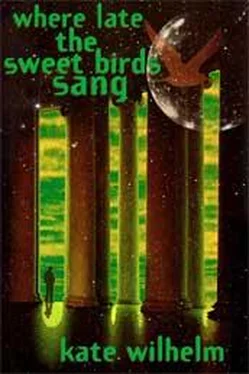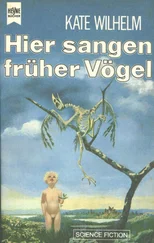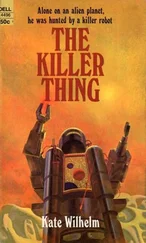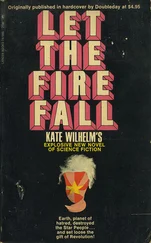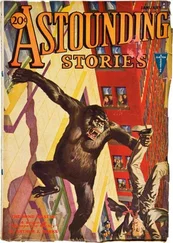Cholera struck in Rome, Los Angeles, Galveston, and Savannah. Saudi Arabia, Kuwait, Jordan, and other Arab-bloc nations issued an ultimatum: the United States must guarantee a yearly ration of wheat to the Arab bloc and discontinue all aid to the state of Israel or there would be no oil for the United States or Europe. They refused to believe the United States could not meet their demands. International travel restrictions were imposed immediately, and the government, by presidential decree, formed a new department with cabinet status: the Bureau of Information.
The redbuds were hazy blurs of pink against the clear, May-softened sky when David returned home. He stopped by his house only long enough to change his clothes and get rid of his boxes of college mementos before he drove out to the Sumner farm, where Walt was staying while he oversaw the construction of his hospital.
Walt had an office downstairs. It was a clutter of books, notebooks, blueprints, correspondence. He greeted David as if he hadn’t been away at all. “Look,” he said. “This research of Semple and Frerrer, what do you know about it? The first generation of cloned mice showed no deviation, no variation in viability or potency, nor did the second or third, but with the fourth the viability decreased sharply. And there was a steady, and irreversible, slide to extinction. Why?”
David sat down hard and stared at Walt. “How did you get that?”
“Vlasic,” Walt said. “We went to med school together. He went on in one direction, I in another. We’ve corresponded all these years. I asked him.”
“You know his work?”
“Yes. His rhesus monkeys show the same decline during the fourth generation, and on to extinction.”
“It isn’t just like that,” David said. “He had to discontinue his work last year — no funds. So we don’t know the life expectancies of the later strains. But the decline starts in the third clone generation, a decline of potency. He was breeding each clone generation sexually, testing the offspring for normalcy. The third clone generation had only twenty-five percent potency. The sexually reproduced offspring started with that same percentage, and, in fact, potency dropped until the fifth generation of sexually reproduced offspring, and then it started to climb back up and presumably would have reached normalcy again.”
Walt was watching him closely, nodding now and then. David went on. “That was the clone-three strain. With the clone-four strain there was a drastic change. Some abnormalities were present, and life expectancy was down seventeen percent. The abnormals were all sterile. Potency was generally down to forty-eight percent. It was downhill all the way with each sexually reproduced generation. By the fifth generation no offspring survived longer than an hour or two. So much for clone-four strain. Cloning the fours was worse. Clone-five strain had gross abnormalities, and they were all sterile. Life-expectancy figures were not completed. There was no clone-six strain. None survived.”
“A dead end,” Walt said. He indicated a stack of magazines and extracts. “I had hoped that they were out of date, that there were newer methods, perhaps, or an error had been found in their figures. It’s the third generation that is the turning point then?”
David shrugged. “My information could be out of date. I know Vlasic stopped last year, but Semple and Frerrer are still at it, or were last month. They may have something newer than I know. You’re thinking of livestock?”
“Of course. You know the rumors? They’re just not breeding well. No figures are available, but, hell, we have our own livestock. They’re down by half.”
“I heard something. Denied by the Bureau of Information, I believe.”
“It’s true,” Walt said soberly.
“They must be working on this line,” David said. “Someone must be working on it.”
“If they are, no one’s telling us about it,” Walt said. He laughed bitterly and stood up.
“Can you get materials for the hospital?” David asked.
“For now. We’re rushing it like there’s no tomorrow, naturally. And we’re not worrying about money right now. We’ll have things that we won’t know what to do with, but I thought it would be better to order everything I can think of than to find out next year that what we really need isn’t available.”
David went to the window and looked at the farm; the green was well established by now, spring would give way to summer without a pause and the corn would be shiny, silky green in the fields. Just like always. “Let me have a look at your lab equipment orders, and the stuff that’s been delivered already,” he said. “Then let’s see if we can wrangle me travel clearance out to the coast. I’ll talk to Semple; I’ve met him a few times. If anyone’s doing anything, it’s that team.”
“What is Selnick working on?”
“Nothing. He lost his grant, his students were sent packing.” David grinned at his uncle suddenly. “Look, up on the hill, you can see a dogwood ready to burst open. Some of the blooms are already showing.”
David was bone tired, every muscle seemed to ache at once, and his head was throbbing. For nine days he had been on the go, to the coast, to Harvard, to Washington, and now he wanted nothing more than to sleep, even if the world ground to a stop while he was unaware. He had taken a train from Washington to Richmond, and there, unable to rent a car, or buy gasoline if a car had been available, he had stolen a bicycle and pedaled the rest of the way. He never realized his legs could ache so much.
“You’re sure that bunch in Washington won’t be able to get a hearing?” Grandfather Sumner asked.
“No one wants to hear the Jeremiahs,” David said. Selnick had been one of the group, and he had talked to David briefly. The government had to admit the seriousness of the coming catastrophe, had to take strict measures to avert it, or at least alleviate it, but instead, the government chose to paint glowing pictures of the coming upturn that would be apparent by fall. During the next six months those with sense and money would buy everything they could to see them through, because after that period of grace there would be nothing to buy.
“Selnick says we should offer to buy his equipment. The school will jump at the chance to unload it right now. Cheap.” David laughed. “Cheap. A quarter of a million possibly.”
“Make the offer,” Grandfather Sumner said brusquely. And Walt nodded thoughtfully.
David stood up shakily and shook his head. He waved at them and went off to his bed.
People still went to work. The factories were still producing, not as much, and none of the nonessentials, but they were converting to coal as fast as possible. He thought about the darkened cities, the fleets of trucks rusting, the corn and wheat rotting in the fields. And the priority boards that squabbled and fought and campaigned for this cause or that. It was a long time before his twitching muscles relaxed enough for him to lie quietly, and a longer time before he could relax his mind enough to sleep.
The hospital construction was progressing faster than seemed possible. There were two shifts at work; again a case of damn-the-cost. Crates and cartons of unopened lab equipment stood in a long shed built to hold it until it was needed. David went to work in a makeshift laboratory trying to replicate Frerrer’s and Semple’s tests. And in early July, Harry Vlasic arrived at the farm. He was short, fat, near-sighted, and short-tempered. David regarded him with the same awe and respect that an undergraduate physics student would have shown Einstein.
“All right,” Vlasic said. “The corn crop has failed, as predicted. Monoculture! Bah! They’ll save sixty percent of the wheat, no more than that. This winter, hah, just wait until winter! Now where is the cave?”
Читать дальше
